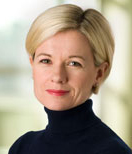| Pearson's Big Ed Biz Is Under Fire | |
| By Jack O'Dwyer | |
| PR exec Kate James, who is leaving the Gates Foundation to be chief corporate affairs officer at Pearson at the start of the year, will bring lots of controversy with her when she delivers the annual Distinguished Lecture to the Institute for PR Thursday at the Yale Club. The IPR website does not mention that James has taken the job with Pearson, moving from a non-profit to a for-profit organization. IPR said it will make an announcement of this before James starts her talk Thursday.
PRW cites instances of Pearson working with elements of the American Legislative Exchange Council, which PRW says is an organization of 2,000 mostly Republican state legislators and 300 corporate representatives that has an undue influence on state lawmaking. Only one Democrat is among 104 legislators in its leadership posts, it says. PRW charges Pearson has undue influence on legislators and improperly funds trips abroad for educators. The blog bigeducationape says, “In essence, every facet of our public educational system, from teacher preparation, curriculum design and content, and testing/assessments from womb to tomb are now owned by a private corporation whose profits skyrocketed into the billions of dollars.” Pearson, with revenues of $8.29 billion, is called “the largest education company in the world” and the “largest book publisher in the world” by Wikipedia. Its properties include the Financial Times Group; 47% of Penguin Random House; 50% of the Economist Group which includes The Economist magazine; Prentice-Hall; Connections Academy, which operates online classes in many states, and |
NEW NETFLIX SERIES: THE TRUMP 2.0 ZONE: A JOURNEY INTO THE FIFTH DIMENSION
OF AMERICAN POLITICS
-
NEW NETFLIX SERIES: THE TRUMP 2.0 ZONEA JOURNEY INTO THE FIFTH DIMENSION OF
AMERICAN POLITICS
OPENING NARRATION:
*"There is a fifth dimension beyond t...
9 minutes ago

